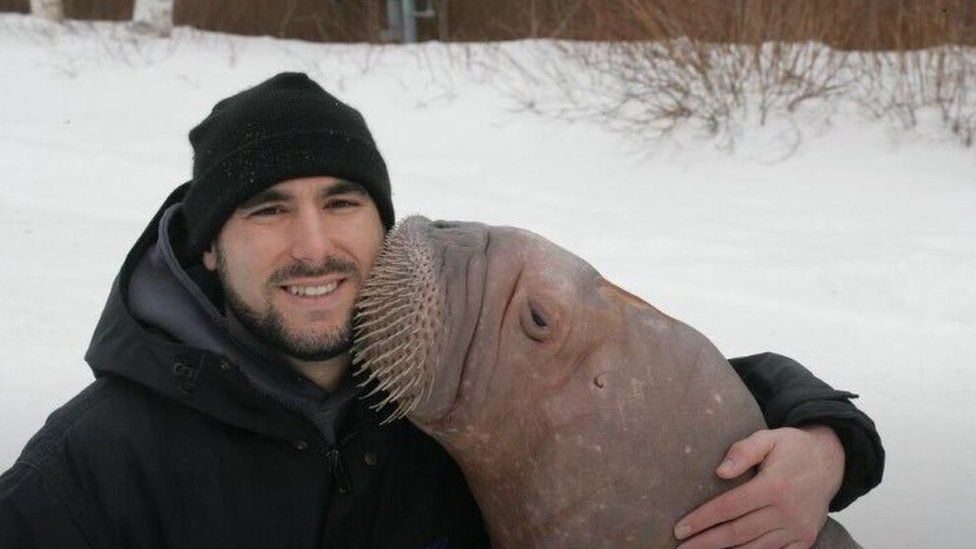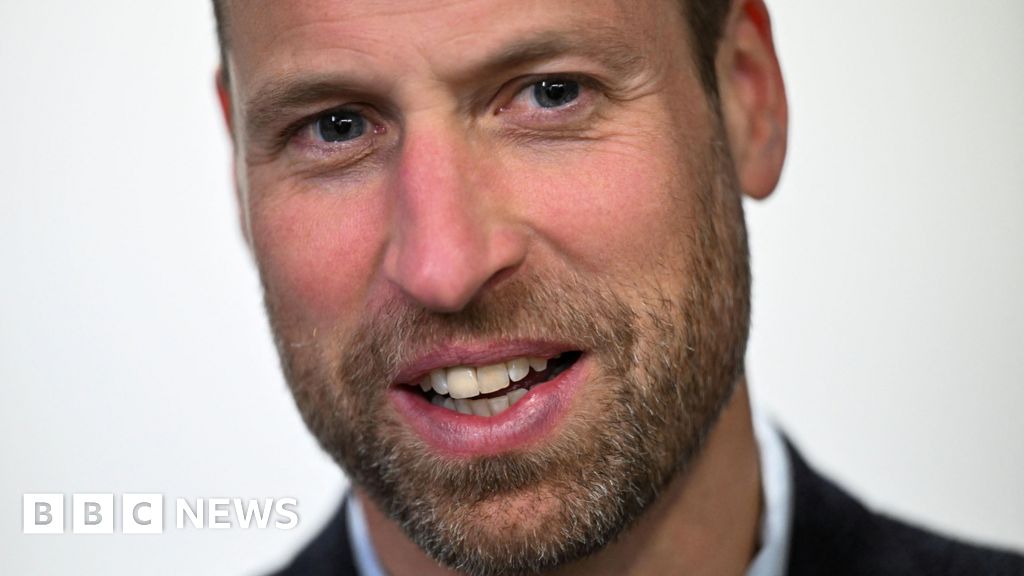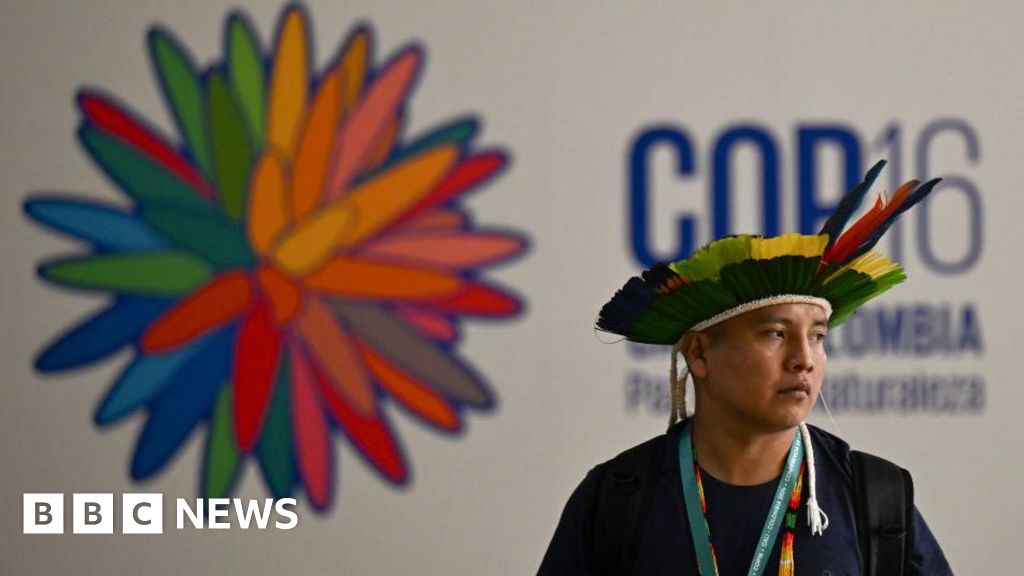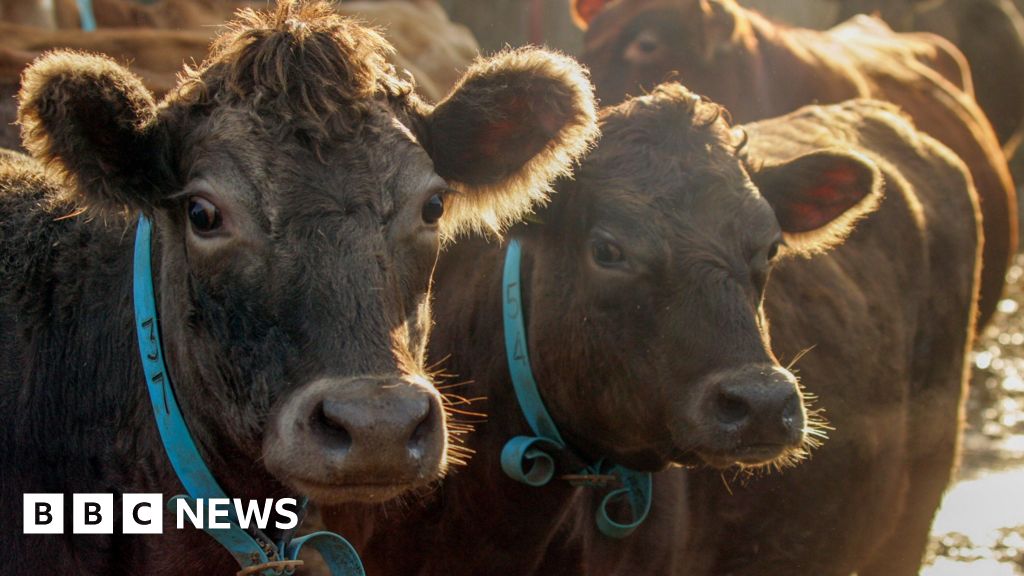 Image source, Phil Demers
Image source, Phil Demers
Phil Demers, a former senior animal trainer at Canada's Marineland, developed a unique bond with Smooshi the walrus
By Nadine Yousif
BBC News, Toronto
After a decade-long battle, a former animal trainer has succeeded in his mission of getting a beloved walrus out of Canada's most popular aquatic zoo, which has faced allegations that it mistreats its animals. Now, Smooshi is embarking on a new life more than 11,000 km (6,800 miles) away.
Late night television host Jimmy Kimmel called it "a heart-warming tale". Newsmagazine Inside Edition called it "love at first sight".
They were describing the unique bond between a Canadian man and a walrus named Smooshi.
Phil Demers met Smooshi in 2004, when she first arrived in Canada from Russia as an 18-month-old calf.
She was one of a few newly acquired walruses at Marineland, one of the most recognisable aquatic zoos in Canada - thanks in part to catchy "everyone loves Marineland" commercials that once dominated domestic airwaves.
Marineland, founded in 1961, was famously where Keiko, the orca star of the film Free Willy, began his public performance career in the early 1980s.
The zoo has courted controversy over the years, dating back to 1977, when the US Department of Fisheries seized six bottlenose dolphins illegally caught by its founder in the Gulf of Mexico, the Toronto Star reported.
It became the site of frequent protests by animal rights activists and has been the subject of several investigations by local police, the US government and Ontario's Animal Welfare Services, with the latter two ongoing.
One recent probe found that animals at Marineland were distressed due to poor water quality. Marineland refuted the findings, and has denied any wrongdoing to its animals over the years.
But Mr Demers was not concerned when he first took the job as an animal trainer at the park, just shy of 22 years old.
"When I started off, I was like everyone else," Mr Demers told the BBC. "I was looking to impress the humans that are my supervisors that seemingly knew what they were doing."
Soon, however, he said he saw flaws in how Marineland treated its animals. He also began to develop an unusually strong bond with Smooshi.
While she was undergoing a medical procedure, Mr Demers said Smooshi "imprinted" on him as he tried to calm her down. The walrus began to think he was its mother, he says, and started following him around the park wherever he went.
The two became inseparable, and the young trainer said he got to know the walrus on a personal level.
"She has a great sense of humour," he said, and would sometimes playfully misbehave to get a reaction out of him.
"She was hyper aware of everyone and of her surroundings. You always had to be aware of her jokes and pranks, as she always kept us on our toes."
At the same time, Mr Demers said he could not bear what he saw as the neglect of animals at Marineland and he worried about Smooshi's welfare.
He quit in 2012 and began his quest to rescue Smooshi.
Image source, SeaWorld Abu Dhabi
Image caption,Smooshi and Kayuk pictured here together in their brand new home in Abu Dhabi, United Arab Emirates
The BBC has reached out multiple times to Marineland for comment on this story but has not received a response.
Marineland has consistently denied any misconduct when it comes to its housing and treatment of animals and has called out "radical animal activist" groups for making false allegations against the zoo.
They have also argued that their display of marine animals is for educational purposes.
Marineland sued Mr Demers soon after he left, banning him from the park and claiming he had trespassed and plotted to steal the 363kg (800lbs) walrus - an allegation he categorically denied. He sued the aquatic zoo for defamation.
But after 10 years and C$250,000 ($185,500; £158,150) in legal fees, Mr Demers' dream of freeing Smooshi became a reality.
Last year, Marineland agreed to drop the lawsuit and to re-house Smooshi and her calf Kayuk, saying in a statement that it was "in the best interest of the walruses".
Mr Demers remains banned from Marineland but the zoo allowed him an emotional reunion with Smooshi as part of the settlement, although the pair were separated by rope and a guard rail.
"She started to climb (the rail) to get to me, and I was trying to reach her, and they immediately took her back," Mr Demers said.
Both Smooshi and Kayuk have since been shipped to a Sea World park in the Arabian gulf - a brand new facility in Abu Dhabi, set to open its doors on 23 May.
Now a letter carrier and animal rights campaigner, Mr Demers said he remains against the captivity of animals.
But he said he is happy the walruses are finally out of Marineland, even if it means Smooshi is now more than 11,000 km away.
Marine mammal biologist Dr Noami Rose also opposes keeping walruses in captivity but said that she, too, believes the new SeaWorld facility in Abu Dhabi will be a better home for Smooshi and her calf.
"The problem with Marineland is that it is so old-fashioned, and so they are limited in what they could provide the animals in terms of enrichment and so on," Dr Rose, who works at the Animal Welfare Institute in Washington DC, said.
Walruses, classified as a threatened species, are typically found around the North Pole and near the Arctic Ocean.
With temperatures in Abu Dhabi averaging 35.5C (96F) during its hottest months, Smooshi will likely be housed indoors in a climate-controlled environment year-round, she said.
Dr Shawn Noren, a marine mammal researcher, said optimal conditions for walruses in captivity include ensuring they are provided adequate nutrition and veterinary care, as well as training and enrichment sessions.
"They'll give novel things to the animal like toys, or novel tasks to learn, so their brains are engaged, which is really important for social animals" like walruses, she said.
In a statement to the BBC, SeaWorld said walruses from several zoos and aquariums around the world have "arrived safely" to Abu Dhabi and are "comfortably settling into their new home".
They added that Smooshi will live with other walruses in a new habitat "designed specifically for the species".
As Smooshi adjusts to her new life, Mr Demers he is mulling on when a good time would be to pay her a visit. A recent video of her from SeaWorld brought him to tears, he said.
"I don't want to interrupt anything, I only just want to go there and see her breathing that fresher air," he said, though he added he would not mind squeezing in a quick hug before flying back to Canada.
.png)
 1 year ago
6
1 year ago
6









 English (US) ·
English (US) ·